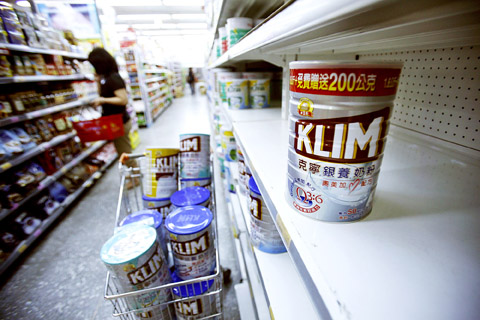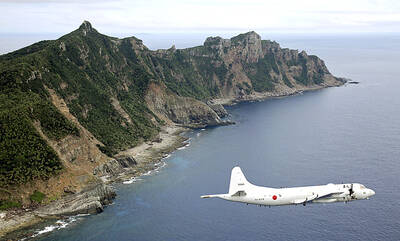China has recalled milk powder sold abroad, a diplomatic source said yesterday, as it continues its efforts to contain the scandal over tainted milk that has sickened thousands of children.
A briefing was held in Beijing on Tuesday for foreign diplomats from several countries, a diplomatic source and a Japanese official said.
“They said that Chinese authorities had recalled milk powder as a precautionary measure, knowing that every [Chinese dairy] product is in line with safety norms since September 14,” said the source, who refused to be named.

PHOTO: WALLY SANTANA, AP
The source was unable to specify whether only milk powder was involved, or if other products such as sweets and biscuits that might contain milk powder were included.
A Japanese official, citing the same briefing, had earlier said the Chinese government had taken measures to halt its exports of dairy products.
“The point made there was that the Chinese government has handled the matter promptly and firmly and has taken measures to halt exports of dairy products, which will not be resumed until their safety is fully confirmed,” the official said on condition of anonymity.
Neither account could be confirmed as Chinese government offices were closed for a holiday.
Chinese Commerce Minister Chen Deming (陳德銘) became the latest top official to promise tighter controls as a result of the scandal but he acknowledged lax business ethics remained a problem.
“The government will improve quality inspection on dairy products,” Chen was quoted as saying by the China Daily. “But more importantly, the dairy enterprises must win consumers’ faith through honesty.”

MISINFORMATION: The generated content tends to adopt China’s official stance, such as ‘Taiwan is currently governed by the Chinese central government,’ the NSB said Five China-developed artificial intelligence (AI) language models exhibit cybersecurity risks and content biases, an inspection conducted by the National Security Bureau (NSB) showed. The five AI tools are: DeepSeek, Doubao (豆包), Yiyan (文心一言), Tongyi (通義千問) and Yuanbao (騰訊元寶), the bureau said, advising people to remain vigilant to protect personal data privacy and corporate business secrets. The NSB said it, in accordance with the National Intelligence Services Act (國家情報工作法), has reviewed international cybersecurity reports and intelligence, and coordinated with the Ministry of Justice Investigation Bureau and the National Police Agency’s Criminal Investigation Bureau to conduct an inspection of China-made AI language

BOOST IN CONFIDENCE: The sale sends a clear message of support for Taiwan and dispels rumors that US President Donald Trump ‘sold out’ the nation, an expert said The US government on Thursday announced a possible sale to Taiwan of fighter jet parts, which was estimated to cost about US$330 million, in a move that an expert said “sends a clear message of support for Taiwan” amid fears that Washington might be wavering in its attitude toward Taipei. It was the first announcement of an arms sale to Taiwan since US President Donald Trump returned to the White House earlier this year. The proposed package includes non-standard components, spare and repair parts, consumables and accessories, as well repair and return support for the F-16, C-130 and Indigenous Defense Fighter aircraft,

CHECKING BOUNDARIES: China wants to disrupt solidarity among democracies and test their red lines, but it is instead pushing nations to become more united, an expert said The US Department of State on Friday expressed deep concern over a Chinese public security agency’s investigation into Legislator Puma Shen (沈伯洋) for “secession.” “China’s actions threaten free speech and erode norms that have underpinned the cross-strait ‘status quo’ for decades,” a US Department of State spokesperson said. The Chongqing Municipal Public Security Bureau late last month listed Shen as “wanted” and launched an investigation into alleged “secession-related” criminal activities, including his founding of the Kuma Academy, a civil defense organization that prepares people for an invasion by China. The spokesperson said that the US was “deeply concerned” about the bureau investigating Shen

DISPUTE: A Chinese official prompted a formal protest from Tokyo by saying that ‘the dirty head that sticks itself out must be cut off,’ after Takaichi’s Taiwan remarks Four armed China Coast Guard vessels yesterday morning sailed through disputed waters controlled by Japan, amid a diplomatic spat following Japanese Prime Minister Sanae Takaichi’s comments on Taiwan. The four ships sailed around the Senkaku Islands — known as the Diaoyutai Islands (釣魚台) to Taiwan, and which Taiwan and China also claim — on Saturday before entering Japanese waters yesterday and left, the Japan Coast Guard said. The China Coast Guard said in a statement that it carried out a “rights enforcement patrol” through the waters and that it was a lawful operation. As of the end of last month,